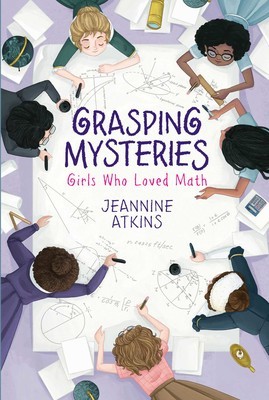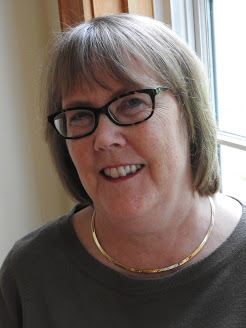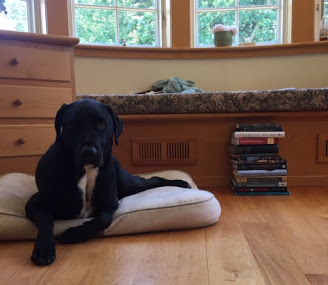Grasping the Mysteries of Poetry, Math, and Science with Jeannine Atkins
 Hello and Happy Poetry Friday! Be sure to visit Molly at Nix the Comfort Zone for Roundup.
Hello and Happy Poetry Friday! Be sure to visit Molly at Nix the Comfort Zone for Roundup. I am super excited because today one of my favorite favorites Jeannine Atkins is here to talk about her latest verse novel Grasping Mysteries: Girls Who Loved Math (Atheneum, 2020), which is earning beautiful reviews and offers a lovely follow-up to Finding Wonders: Three Girls Who Changed Science.
Publisher's description:
After a childhood spent looking up at the stars, Caroline Herschel was the first woman to discover a comet and to earn a salary for scientific research. Florence Nightingale was a trailblazing nurse whose work reformed hospitals and one of the founders of the field of medical statistics. The first female electrical engineer, Hertha Marks Ayrton registered twenty-six patents for her inventions.
Marie Tharp helped create the first map of the entire ocean floor, which helped scientists understand our subaquatic world and suggested how the continents shifted. A mathematical prodigy, Katherine Johnson calculated trajectories and launch windows for many NASA projects including the Apollo 11 mission. Edna Lee Paisano, a citizen of the Nez Perce Nation, was the first Native American to work full time for the Census Bureau, overseeing a large increase in American Indian and Alaskan Native representation. And Vera Rubin studied more than two hundred galaxies and found the first strong evidence for dark matter.
Told in vibrant, evocative poems, this stunning novel celebrates seven remarkable women who used math as their key to explore the mysteries of the universe and grew up to do innovative work that changed the world.
 JA: Thank you for the three questions, Irene. My favorite number, because of the bears, blind mice, musketeers, and the triangles of beginnings, middles, and ends.
JA: Thank you for the three questions, Irene. My favorite number, because of the bears, blind mice, musketeers, and the triangles of beginnings, middles, and ends.The delicious
JA: Looking back from when a book is ready to go into the world, it all seems delicious. But I’ll get to the more truthful part with your next question. For me, the small things within big stories are what make my mouth water. I can read through many generalizations without wanting to sit up straight, but when I run across something like doctors calling Florence Nightingale the Lady with a Hammer, or the names of Marie Tharp’s poodles or the linoleum flooring shop where Vera Rubin got a free cardboard tube to construct a telescope with her father, I feel as if I’ve been invited into a life. I need to get back to the math behind discoveries, but often the small things help me shape a poem.
The difficult
[image error]JA: I generally love research, a fancy name for reading and daydreaming with a focus on how to arrange facts. But to be honest, researching math was not the most fun I’ve ever had. I wrote Finding Wonders: Girls Who Changed Science not because of my science skills, but I love the natural world, which gave me a way to connect with an astronomer, a biologist, and a paleontologist. Researching that book meant learning more about women in STEM, and I became aware of how important math skills are to success in most present-day science. I wanted to cheer on girls who already love math and show young readers who don’t that there’s more to the subject than they realize. So I pushed myself to learn. When it was hard, I kept going to honor the women from history I came to know and love.
The unexpected
 Kirby! (Jeannine's
Kirby! (Jeannine'sresearch buddy)JA: Sometimes my husband passes my stacks of science books and says, “This isn’t what I expected when I met you in 1983.” Me neither. Back then I read Virginia Woolf and was not much of a math or science student. I’m far from an expert now. But I know what questions to ask. Caring about the natural world, today’s girls and boys, and the history of women has brought me to some beautiful places.
Thank you, Jeannine!
And I shall leave you with a favorite quote from each section of the book:
Caroline Herschel -- "Night isn't a veil, but a door."
Hertha Marks Ayrton -- "Sarah loves math for its loyalty. / Numbers may disappear, but new ones take their place." [Before she was called Hertha, her parents named her Sarah.]
Marie Tharpe -- "Every map is a compromise."
Katherine Johnson --"She loves best what she can't count: / raindrops, leaves rustling into a chorus, / stars blinking in and out of sight over the hills."
Edna Lee Paisano -- "The river remembers her shape."
From Vera Rubin -- "Doubt paves the path to discovery."
... and a writing prompt! Each section features a poem called "A Girl's Education." Write your own poem with that title.
This week's ArtSpeak: RED poem "Saturday Morning" after Vermeer's "The Little Street" can be found here. Thank you for reading!



